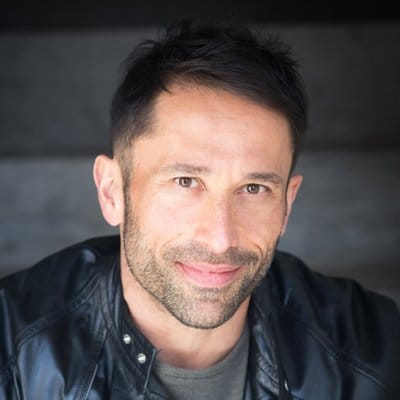
This article was originally published in February 2019 on our ‘Writers on Writers Vic’ page, for our 30th year of operating.
Italian-born Mark Brandi graduated with a criminal justice degree and worked in the justice system before changing careers and becoming a writer. His debut novel Wimmera won the British Crime Writers’ Association Debut Dagger and was named Best Debut in the 2018 Australian Indie Book Awards. It was also shortlisted for the Australian Book Industry Awards Literary Fiction Book of the Year and the Matt Richell Award for New Writer of the Year. Mark has also contributed to many publications including The Guardian, The Age, The Big Issue and Meanjin. He started writing his latest book The Rip in July 2017, just after Wimmera was released.
“The bottom line is that you only become a better writer through the act of writing – there are no shortcuts.”
You’re on the record as saying that your involvement with Writers Victoria helped you as a writer. Tell us about that involvement. Did you sign up as a member? Do a workshop? Work with a mentor? Get a manuscript assessment?
When I first signed up as a member, I wasn’t yet brave enough to call myself a writer. But I found the quarterly magazine The Victorian Writer helpful, with articles on the writing life, tips, and prize opportunities.
What difference did this experience make to you and your writing?
The first big moment was in 2014, when Writers Victoria ran a competition offering emerging writers the chance to submit a synopsis of their current work, with the best entry judged publisher Aviva Tuffield.
I was lucky to be selected as runner-up, which was the first time my novel manuscript (Wimmera) had been awarded. More importantly, I received feedback that would prove invaluable to the novel’s development.
A year or so later, as I was getting close to completing Wimmera, I was selected for the Writers Victoria Personal Patrons program. This gave me access to a writing studio at the Old Melbourne Gaol, where I was able to put the finishing touches on the manuscript.
When did you decide to leave your full-time job and what would you say to emerging authors that are considering doing the same thing to be able to concentrate on their writing?
It’s a tough decision, financially risky, and not one that should be taken lightly. For me, I decided to leave full-time work and focus on writing after a serious bicycle accident gave me a sharp reminder that life can be very short. I was also fortunate to have a bit of a lucky break, which gave me some breathing space financially.
It depends on your individual circumstances, naturally, but also your personality. I’m probably a bit of a risk-taker – I needed to put more on the line if I was going to give writing a proper crack, and not feel like a hobbyist. I felt that my first novel required all my energy and attention to produce the story I wanted to tell.
Luckily, it was worth the risk. But many other writers find their craft enriched by their day job (while also paying the bills). But if you do decide to leave full-time work, be sure you are mindful of the risks, and that any financial reward may be small (and a long time coming).
What kind or support or resources are most helpful to you as a writer?
Writing can be a lonely business, so knowing others are facing similar challenges can give solace in the tougher moments. I like reading about how other writers approach their craft, but am also mindful that everyone has to find their own path. What works for one person may not work for another, so I’m fairly discerning about which tips I take on board.
Naturally, I also like reading great writing, especially from emerging writers, and The Victorian Writer magazine always offers something worthwhile.
Based on your own experience, what advice do you have for aspiring and emerging writers about engaging with their local writers’ centre?
Without hesitation, you should sign up for a membership. In terms of what might be the best support for your writing process, this will vary. But there’s such diversity in what’s on offer, you’re bound to find something useful.
You’ve also done some tutoring, what do you enjoy most about being a tutor?
In writing, as with most art forms, there are no right or wrong techniques. For every piece of writing wisdom, there is often a conflicting piece of advice – it’s really about finding what works best for you.
In general, I find practical exercises to be the most beneficial in a writing workshop. It’s amazing what can be produced in a short space of time, without overthinking the task. Indeed, my first novel began as a prompted writing exercise in a short story class.
The bottom line is that you only become a better writer through the act of writing – there are no shortcuts.
Anything you’d like to add?
I’m grateful for the opportunities and support Writers Victoria has given me – we’re lucky to have such an exceptional organisation supporting Victorian writers.
